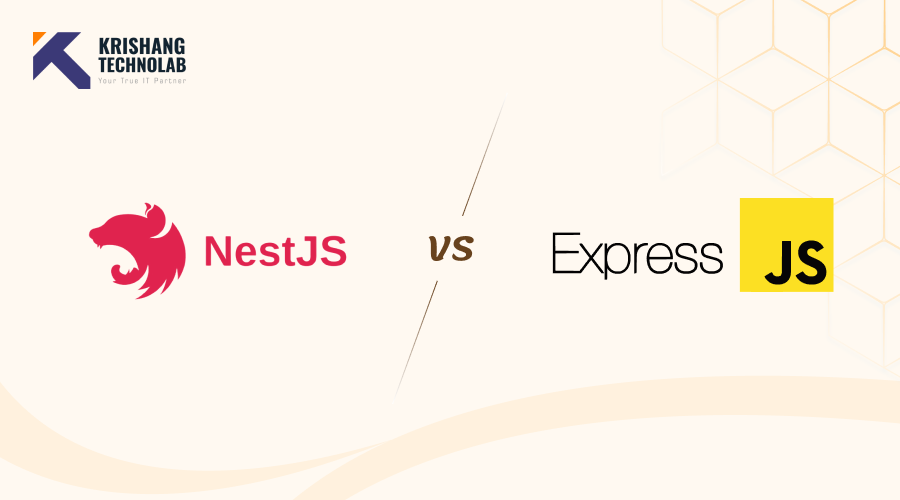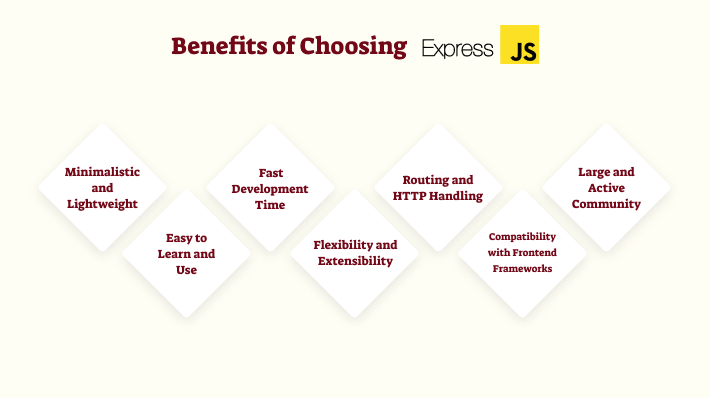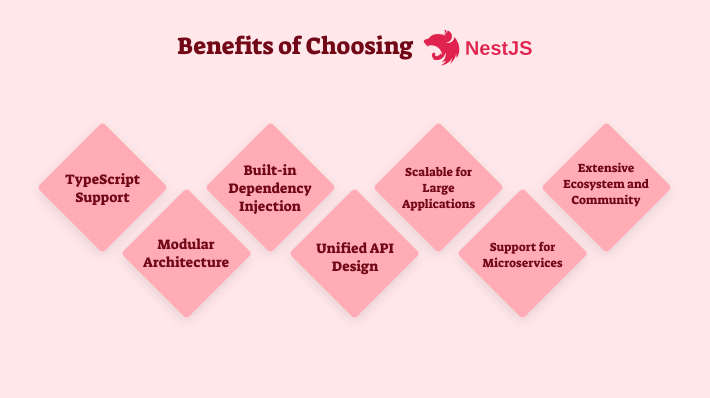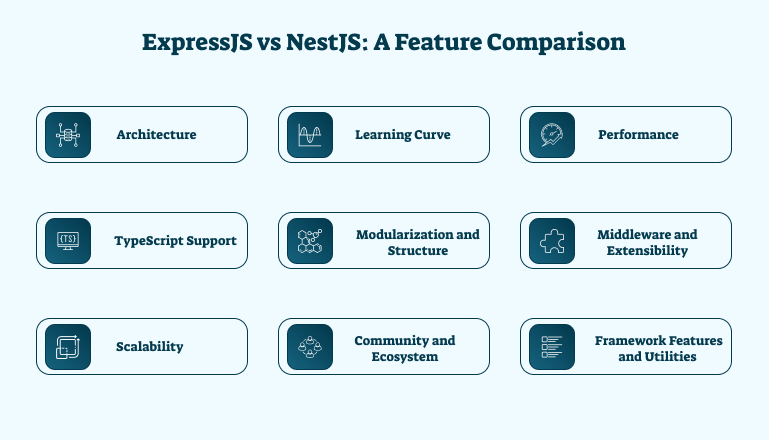
When building large-scale web applications, developers often turn to Node.js as their backend technology of choice. Node.js, renowned for its event-driven, non-blocking architecture, can manage multiple connections concurrently, rendering it perfect for high-performance, scalable web applications. In fact, over 6.3 million websites rely on Node.js to power their backend services. However, while Node.js provides the foundation for backend development, it doesn’t handle all the tasks by itself. This is where frameworks like Nestjs vs Expressjs come into play.
To manage HTTP requests, serve files, and streamline development, developers often rely on frameworks that complement Node.js. Two popular frameworks in this space are Expressjs and Nestjs, each offering distinct advantages for building web applications.
The decision between Nestjs vs Expressjs can be challenging for CTOs and developers, as both have their own strengths. To make an informed choice, it’s important to understand the unique features, benefits, and use cases of each framework. In this blog, we’ll dive into a detailed comparison of Express.js vs Nest.js to help you decide which framework is best suited for your next web development project.
What is ExpressJS?
ExpressJS is a lightweight, minimalistic, and flexible Node.js web application framework. It simplifies the process of building robust web applications and APIs by providing a thin layer of fundamental web application features, such as routing, middleware support, and template engine integration.
Key Features
- Minimalistic: Express focuses on being unopinionated, offering developers flexibility in how they structure their application.
- Middleware Support: Express provides built-in middleware and allows the integration of third-party middleware for various tasks, such as logging, authentication, and more.
- Routing: Express offers an intuitive routing mechanism to handle HTTP requests, making it ideal for building RESTful APIs.
- Extensible: With a large ecosystem of plugins and extensions, Express can be extended to fit nearly any use case.
- Fast and Lightweight: Express doesn’t impose a heavy structure, making it a good choice for small to medium-sized applications or when a lightweight solution is required.
When to Use ExpressJS:
- RESTful APIs
- Single-page applications (SPAs)
- Microservices
- Real-time applications (when combined with WebSockets)
What is NestJS?
NestJS is a framework built on top of Express (though it can also use Fastify) that leverages modern JavaScript and TypeScript features to create scalable, maintainable, and testable backend applications. It is heavily inspired by Angular, providing a modular architecture, dependency injection, and decorators, making it suitable for large-scale applications.
Key Features:
- TypeScript First: While Express can be used with TypeScript, NestJS is built from the ground up with TypeScript, enabling strong typing, better autocompletion, and compile-time checking.
- Modular Architecture: NestJS promotes the use of modules, allowing web developers to organize code into isolated pieces, making it easier to scale applications.
- Dependency Injection: Similar to Angular, NestJS uses dependency injection to manage services, making it easier to manage complex application logic and facilitate testing.
- Built-in Tools: NestJS comes with a powerful CLI to scaffold projects, generate components, run tests, and handle other development tasks.
- Extensibility and Support for Multiple Libraries: While Express is built into NestJS by default, NestJS also supports other libraries such as Fastify for performance optimization and GraphQL for API management.
- Focus on Testability: NestJS emphasizes test-driven development (TDD), providing support for unit testing, integration testing, and end-to-end testing with various tools.
When to Use NestJS:
- Large-scale enterprise applications
- Microservices architecture
- Real-time applications (WebSockets, GraphQL)
- Server-side rendering (SSR) with Angular
Benefits of Choosing ExperssJS

1. Minimalistic and Lightweight
ExpressJS is designed to be minimal and unopinionated, meaning developers have the freedom to structure their applications as they see fit. Unlike other frameworks that impose specific architectures or guidelines, Express allows for quick and straightforward development without unnecessary complexity, making it ideal for small-to-medium-sized projects or MVPs (Minimum Viable Products).
2. Easy to Learn and Use
With a simple, intuitive API and minimal boilerplate code, ExpressJS is incredibly beginner-friendly. Developers who are familiar with JavaScript and Node.js will find it easy to get started with Express, as the framework doesn’t require steep learning curves. Its lightweight nature means that developers can focus more on building their app rather than dealing with complex configurations.
3. Fast Development Time
Thanks to its simplicity, ExpressJS enables rapid web application development. Developers can set up routes, middlewares, and HTTP request handling with ease, speeding up the development process. This is particularly beneficial when working on projects with tight deadlines or when creating prototypes to validate an idea quickly.
4. Flexibility and Extensibility
ExpressJS provides the flexibility to choose your own tools and libraries. It does not dictate any specific architecture or methodology, giving developers the freedom to decide how to implement different features. With support for a wide range of plugins, middleware, and third-party libraries, Express is highly extensible and can be tailored to fit the specific needs of a project.
5. Large and Active Community
The ExpressJS community is one of the biggest and most active in the Node.js environment. This means developers can rely on a wealth of tutorials, forums, and open-source contributions to help solve problems. The community-driven nature ensures that Express is well-supported, with plenty of resources for developers at all skill levels.
6. Routing and HTTP Handling
Express simplifies routing by providing a clean, straightforward way to handle HTTP requests. You can define routes for specific HTTP methods (GET, POST, PUT, DELETE, etc.) and organize them into modules. This makes it easy to build RESTful APIs, with each route corresponding to a specific action in the app.
7. Compatibility with Frontend Frameworks
ExpressJS is highly compatible with various frontend frameworks like Angular, React, and Vue.js. It can easily serve static files and interact with frontend applications through APIs. This makes it a great choice for building full-stack applications or serving as the backend for modern single-page applications (SPAs).
Read More About : How to outsource website development services
Benefits of Choosing NestJS

1. TypeScript Support
NestJS is built with TypeScript at its core, offering all the benefits of static typing, such as early error detection and better code quality. TypeScript’s support makes it easier to maintain large-scale applications by providing stronger tooling, better refactoring capabilities, and improved developer productivity.
2. Modular Architecture
NestJS’ modular design is one of its most distinctive features. The framework encourages developers to divide their application into modules, which makes it simpler to maintain and expand as it develops. This structure leads to better separation of concerns, reusability of components, and easier maintenance.
3. Built-in Dependency Injection
NestJS includes a powerful dependency injection (DI) system, which simplifies the management of application components. DI allows services, controllers, and modules to easily share dependencies, improving the maintainability and testability of the code. This feature helps developers write more efficient and decoupled code, promoting better overall architecture.
4. Unified API Design
With NestJS, you can build RESTful APIs, GraphQL APIs, and even WebSocket APIs all within the same framework. This unified approach allows developers to stick to a single framework for multiple API styles, reducing complexity and improving the consistency of the application.
5. Scalable for Large Applications
Due to its modular structure and design principles, NestJS is a great choice for large-scale applications that need to handle complex business logic. The framework’s scalability makes it an ideal option for building enterprise-grade applications, APIs, microservices, and even serverless architectures.
6. Extensive Ecosystem and Community
NestJS benefits from a rapidly growing ecosystem and a supportive community. Developers have access to a rich set of tools, libraries, and resources to speed up development. The framework’s popularity has led to a wealth of tutorials, documentation, and community-driven plugins, which can help developers tackle challenges more efficiently.
7. Support for Microservices
NestJS is designed with microservices in mind, offering first-class support for building distributed systems. With its built-in microservice package, developers can easily create services that communicate with each other using different communication protocols (e.g., TCP, Redis, or RabbitMQ). This makes it a powerful option for teams looking to implement microservices-based architectures.
Read More About : How to Hire a Dedicated Development Team
ExpressJS vs NestJS: A Feature Comparison
When evaluating ExpressJS and NestJS, understanding their core features and how they align with your project’s requirements is essential. Below is a detailed comparison based on key aspects like architecture, performance, learning curve, and more.

1. NestJS vs ExpressJS: Architecture
- NestJS:
NestJS, on the other hand, offers a more opinionated and structured approach. Built on top of Express (or Fastify), NestJS incorporates design patterns such as dependency injection, modules, and controllers, making it easier to manage larger applications. The modular architecture encourages clean, maintainable, and scalable code, which is ideal for enterprise-level applications. - ExpressJS:
Express is known for its minimalist, unopinionated nature. It provides only the basic tools necessary for handling HTTP requests and responses, giving developers the freedom to design their application structure. This flexibility is great for small projects or when developers prefer full control over the architecture. However, for larger applications, this may lead to inconsistent structures and additional complexity.
2. NestJS vs ExpressJS: Learning Curve
- NestJS:
NestJS has a steeper learning curve, primarily due to its use of TypeScript, Object-Oriented Programming (OOP) principles, and design patterns such as decorators, modules, and services. Developers must grasp these concepts to take full advantage of NestJS’s capabilities. However, once familiarized with the structure, developers can leverage its scalability and maintainability benefits for more complex applications. - ExpressJS:
Express has a lower learning curve due to its simplicity. Developers who are already familiar with JavaScript and Node.js can quickly start building applications with minimal setup. Express focuses on providing the essentials without enforcing a particular coding style or architecture, making it ideal for beginners or rapid development projects.
3. NestJS vs ExpressJS: Performance
- NestJS:
NestJS, while slightly slower than Express due to its added layers of abstraction (such as dependency injection and the modular structure), still offers impressive performance for large-scale applications. Its performance is more than adequate for enterprise-grade applications, especially where scalability and long-term maintainability are more critical than raw speed. - ExpressJS:
Express’s simple design makes it very performant. The framework doesn’t add much overhead, which means it can process a large number of requests quickly. This makes Express a great choice for small to medium-sized applications, microservices, or APIs that need to handle fast requests with minimal delay.
4. NestJS vs ExpressJS: TypeScript Support
- NestJS:
NestJS is built with TypeScript at its core, which means it benefits from automatic type safety, strong typing, and enhanced IDE support right out of the box. This makes development faster and more reliable, especially for large applications where strict type checks and early error detection are critical. - ExpressJS:
Express is written in JavaScript, and while it’s possible to integrate TypeScript with Express, it requires additional configuration and setup. TypeScript support is not as seamless as it is in NestJS, which could lead to extra work for developers who prefer strong typing and static analysis.
5. NestJS vs ExpressJS: Modularization and Structure
- NestJS:
NestJS embraces modularity as a core design principle. Applications in NestJS are split into distinct modules, which help organize code into logical, reusable components. Each module encapsulates functionality, making it easier to scale applications and maintain clean separation of concerns. This structure is especially useful in larger, more complex applications. - ExpressJS:
Express gives developers the freedom to build their application in any structure they prefer. While this flexibility is beneficial for small projects or those that require unique configurations, it can also lead to a lack of consistency and difficulties in scaling the application as it grows. Developers must create their own systems for organizing code, which may result in harder-to-maintain projects over time.
6. NestJS vs ExpressJS: Middleware and Extensibility
- NestJS:
NestJS also supports middleware and integrates easily with third-party libraries, but it offers additional built-in features like guards, interceptors, and pipes for handling tasks such as validation, logging, and request transformation. This provides developers with more out-of-the-box functionality and a standardized way to handle these tasks within the framework. - ExpressJS:
Express’s flexibility allows developers to choose the middleware they need for specific functionalities, such as authentication, logging, or input validation. Since Express is a lightweight framework, it doesn’t come with many built-in tools, but it supports a wide range of third-party middleware, giving developers the flexibility to extend the framework as needed.
7. NestJS vs ExpressJS: Community and Ecosystem
- NestJS:
NestJS, although newer than Express, has quickly built a strong and active community. Its use of TypeScript and modern development practices has attracted a large number of developers who prefer structured and scalable applications. NestJS has a rapidly growing ecosystem, with official modules for working with databases, testing, WebSockets, microservices, and more. - ExpressJS:
ExpressJS has a vast and mature ecosystem due to its long-standing popularity. It has a large number of available plugins, tutorials, and resources. The community support is robust, with many contributors and third-party tools designed specifically for Express-based applications. Express is a well-tested, reliable solution for web development.
8. NestJS vs ExpressJS: Scalability
- NestJS:
NestJS excels in scalability. Its modular structure and built-in features like dependency injection, testing utilities, and support for microservices make it an ideal choice for larger applications that need to scale efficiently. NestJS is built to handle large, complex systems, and its architecture is specifically designed to make adding new features or scaling up the application as easy as possible. - ExpressJS:
While Express is lightweight and fast, its flexibility can make scalability more challenging. As the application grows, developers need to manually implement features such as separation of concerns, microservices, and service layers. While possible, managing complex projects in Express can be cumbersome, and the application structure may become harder to maintain.
9. NestJS vs ExpressJS: Framework Features and Utilities
- NestJS:
Comes with a lot of built-in features like authentication, validation, middleware, guards, pipes, and more. It’s perfect if you need a full-featured, ready-to-go solution for building complex applications.
- ExpressJS:
Express provides only the bare essentials for building web applications. While it’s highly extensible and has a lot of third-party middleware available, it doesn’t come with as many out-of-the-box tools as NestJS.
Conclusion
When deciding between NestJS and ExpressJS, the choice largely depends on the scale and complexity of your project. For small to medium-sized applications that need speed and ease of use, ExpressJS is a lightweight, adaptable framework. It offers great control over your app’s architecture, making it perfect for developers who need a straightforward solution.
On the other hand, NestJS is more suited for larger, enterprise-level applications, particularly those requiring a structured, maintainable codebase with built-in features like dependency injection and TypeScript support. If you’re building complex, scalable systems or microservices, NestJS provides a more robust solution with its modular architecture and tools for long-term maintainability. Ultimately, ExpressJS is great for simple projects, while NestJS excels in more complex, large-scale applications.
This blog has thoroughly covered the key aspects of Expressjs and Nestjs, including their advantages, and a full comparison. With this knowledge, you’re equipped to make an informed decision on the best Node framework for your application. If you’re planning to develop a web application for your business using either NestJS or ExpressJS, or need expert advice on selecting the right framework for your project, Krishang Technolab is here to assist. As a leading software development company and trusted technical advisor, we guide businesses, CTOs, CIOs, and leaders through every phase of their development journey. We help you build innovative solutions that turn your vision into reality. Reach out to us today and let us support your path to digital success.